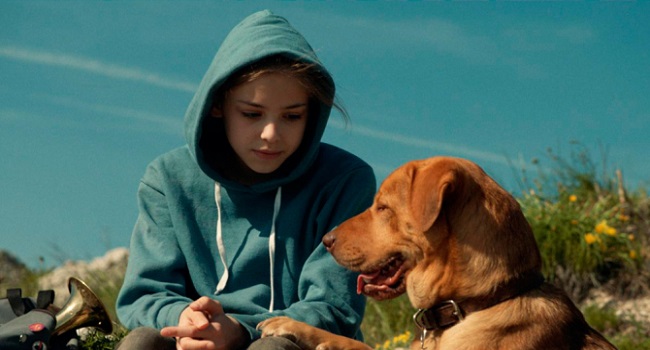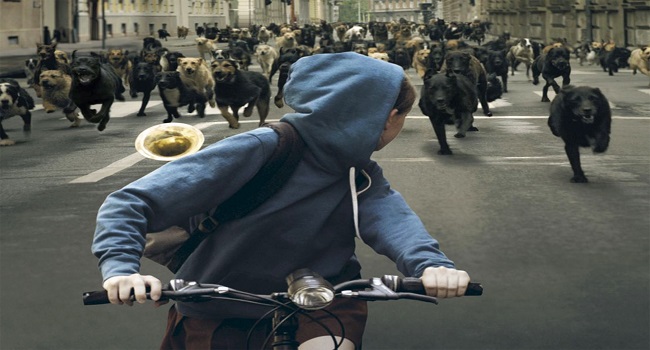If there such a thing as an art-house blockbuster then one cannot help but think that Kornél Mundruczó’s White God has the makings to fit such a designation. Winner of the Un Certain Regard Award at Cannes last year, the film takes a simple premise and weaves it into a ferociously engrossing tale that is as much about Europe’s class system as it is about a girl and her dog. White God may wear the sheepish cloak of a film like Robert Bresson’s Au Hasard Balthazar, but the animal at the centre is not content with bearing the burdens of mankind’s sins.
Despite sharing many similarities with Bresson’s classic, White God plays more like a thrilling mash-up of White Fang and Rise of the Planet of the Apes. Mundruczó’s socially conscious plot focuses on thirteen-year-old Lili (Zsófia Psotta) who is forced to spend time with her estranged father, Daniel (Sándor Zsótér), while her mother is away in Australia. A former professor now stuck working as an abattoir, Daniel finds it hard to adapt to life in his cramped apartment with his moody daughter. It does not help matters that Lili seems attached at the hip to her beloved mixed-breed dog Hagen.
Refusing to pay the government fee for housing dogs – regarded as vermin by most of society – and after several incidents, one of which involving a neighbour lying to authorities about being bitten by Hagen, Daniel abandons the dog on the streets of Budapest. It is a decision that both fuels Lili’s rebellion against her father, she conducts her own search for the dog against his wishes, and exposes Hagen to the harsh underbelly of life in Hungary. In a constant fight for survival, and encountering individuals who often flaunt their superiority in brutal ways, Hagen can only endure so much before he decides to give the city a taste of its own medicine!
Subtle in the way it approaches its social commentary, it is easy to look at White God as a standard tale about a girl’s unwavering love for her dog in the face of constant adversity. However, it is through Mundruczó’s poignant statements on the economic divide and the treatment of immigrants, that the film is able to paint such a vivid and powerful portrait of a society where even the homeless feel superior to the “other”. White God’s understated, and impactful, message is an essential element to keeping the film grounded even in times when it appears to be veering off the rails. This is especially true for the latter sections of the film, which finds Mundruczó in full blockbuster mode, where Hagen leads a glorious canine uprising.
Playing like a thriller, that is always one toe away from crossing the line into straight horror, Mundruczó fills the latter sections of his film with delightfully eerie imagery. Whether it is the dogs chasing Lili down a deserted street, or the chills sent down the spine at the sight of the mobilized dogs surrounding a concert hall, Mundruczó’s film goes for the jugular from both a story and visual standpoint.
While there is something undeniably refreshing about seeing Hagen and his posse systematically get revenge on those perceived to be superior, the pacing does tend to drag the narrative out more than needed. Fortunately White God’s wonderful cinematography and standout performances, from Zsófia Psotta and Sándor Zsótér, consistently keep the film riveting even in its uneven moments. Bold in its execution and gripping in its socially conscious narrative, White God is one of the most surprising and invigorating films audiences will encounter this year.
Screens
White God begins its exclusive run at the TIFF Bell Lightbox on Friday.
4 Comments
Comments are closed.



The cinematography looks nauseating.
Do not let the trailers mislead you, the cinematography is far from nauseating. There is plenty to enjoy from a visual perspective with this film.
Ok fantastic
White God is brilliant film. Thanks for posting